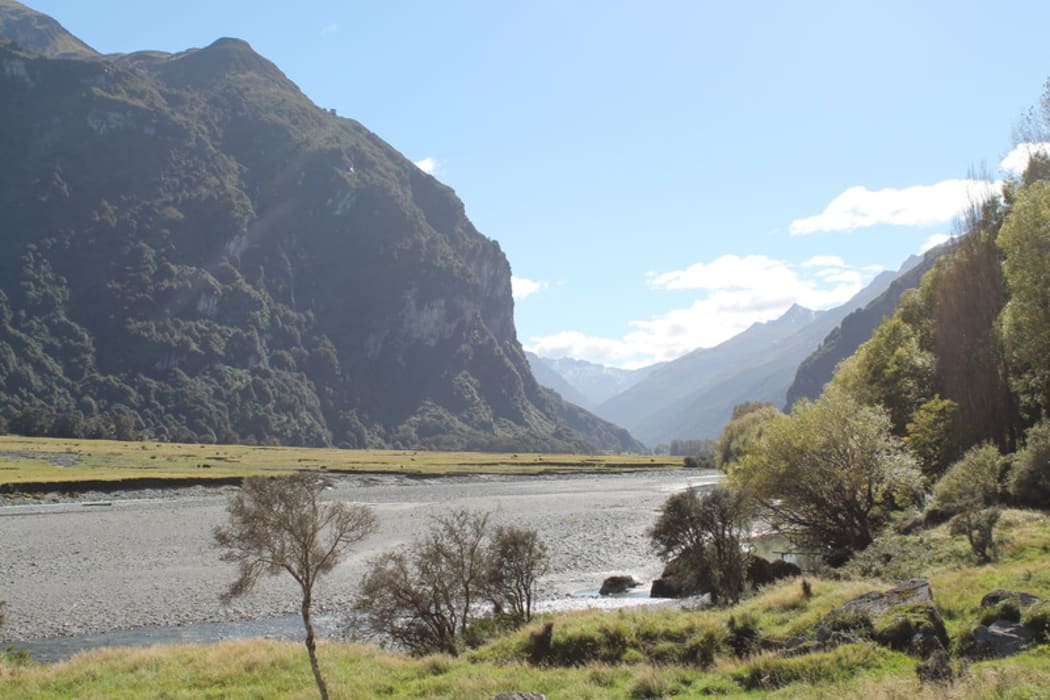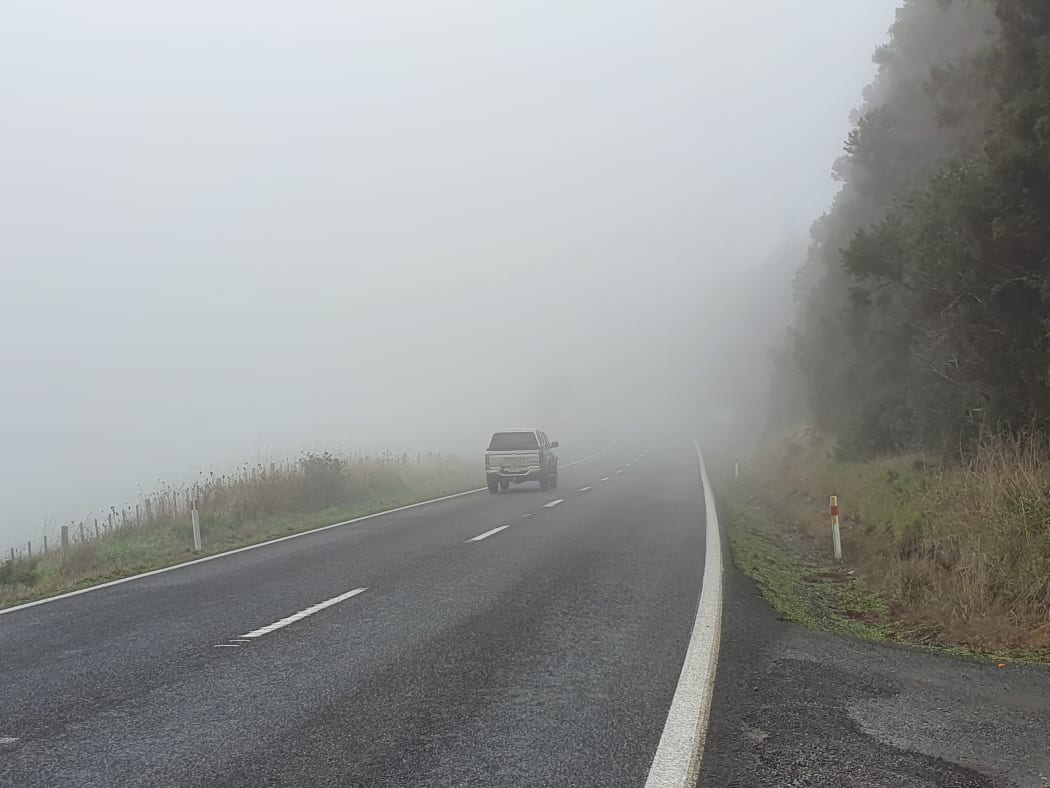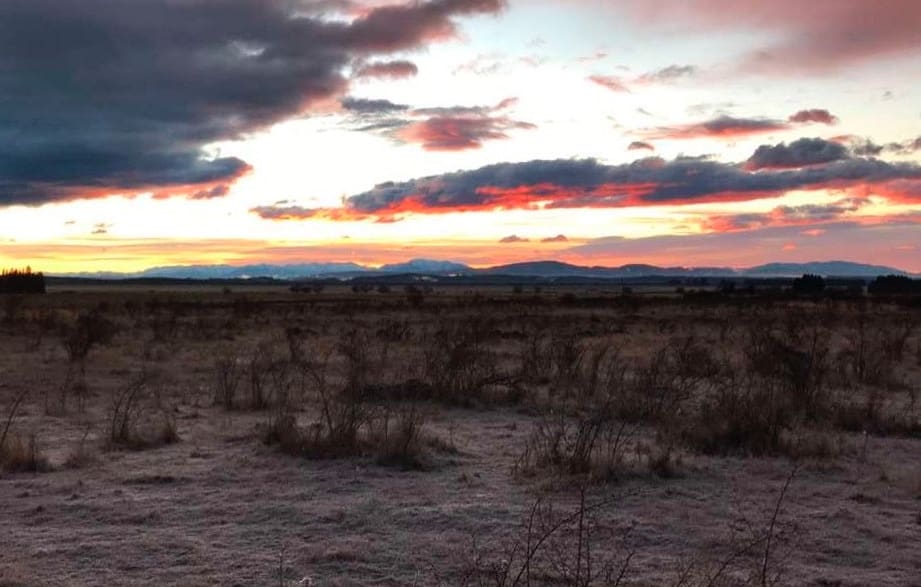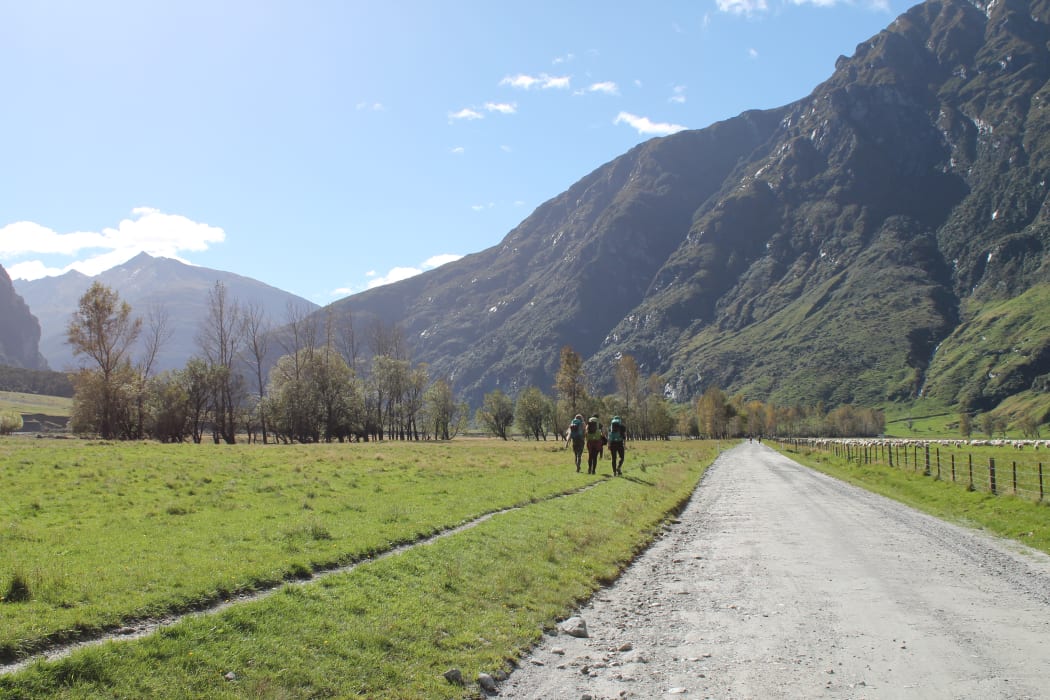
Matukituki Valley, near Wanaka Photo: RNZ/Carol Stiles
Farmers in the picturesque Matukituki Valley near Wanaka are enjoying being able to move stock easily now that tourist traffic has quietened down. The mild start to winter around much of the country is finally giving pasture a chance to grow.
Our contact in Northland says more rain and warmth has helped grass growth along this week and paddocks regrassed after the drought are rocketing along. Farmers are well through autumn calving. The local rugby club has reopened after the Covid lockdown and that's huge for the community which has missed the social interaction. He says people just want to be back and involved with each other. They're really looking forward to the first competition next week.
Around Pukekohe an early morning, mid week minimum temperature of five degrees was the only taste of winter this week with daily temperatures ranging from mild to cool. Light winds and showers have kept the soils moist but not enough to prevent vegetable seed sowing or planting. Kiwifruit orchardists have generally had good weather to get on with vine pruning.
On Wednesday parts of Waikato and the Hauraki plains were shrouded in thick fog all day. Otherwise there's been a mix of cloud and fine periods. Grass is still growing - people who've been mowing lawns will tell you it's much thicker than it has been. The National Agricultural Fieldays - which is the largest agricultural event in the southern Hempsihere should have been on this week - so Hamilton is much quieter than usual. Typically more than 110,000 people attend.

Waikato Fog at 3pm Photo: RNZ/Carol Stiles
The kiwifruit marketer Zespri reported its results for the 2019/2020 year this week. Its profit was almost $201 million, up 21 million on the previous year. A kiwifruit orchard growing gold fruit is returning an average of $161,660 a hectare - the best results ever - and the return for green fruit is also a record -at just over $67,000 per hectare.
King Country had sun on Friday morning . There's been a reasonably mild start to winter and good rain. Some dry patches on hills will take a while to recover but even the hills have some moisture on them now. Grass growth has been strong, scanning is in full swing and prices are slowly improving to pre covid levels - for both sheep and beef. There's been a strong lift in prices for store stock - that's where it's sold to another farmer - reflecting that people now have more grass on farms and can feed them.
Over in Taranaki, it's been wet and miserable. Our contact says he hung up the gumboots on 31 May and sold the farm. Before the pandemic came, he and his family were meant to escape for a six month get away in Europe and today he was meant to be getting on a plane to Bali. He says he's just going to enjoy a bit of quiet time before searching for what's next
On the East Coast, near Gisborne, we're told the weather's been a dream. The region had good rain last week which was followed up with beautiful days getting up to nearly 20 degrees - ideal for grass growth. The good weather means the farms that struggled through the drought are getting more time to recover. Farmers are getting prepped for the start of lambing in a month and are starting to set stock the ewes.
Down the road in Hawkes Bay, there is still a need for a lot of rain. The region had about 30-90mm's about 10 days ago. The farmer we spoke to says that if you dig a hole it's still very dry underfoot. He says most of the region is green, but the wind is putting a halt to growth. The vineyards are well into to winter jobs such as pruning and general maintenance, like replacing posts broken during the harvest.

Tora on the Wairarapa coast Photo: RNZ /Dom Thomas
In Wairarapa the weather's been great. - the days have been warm with good amounts of rain coming at night. A farmer says winter has been kind so far but is well aware that can suddenly change. The soil is pretty much at capacity so anymore rain and it will sit on top. Pasture levels are about usual for winter and she has stock at the run off until calving begins mid-July.
Manawatu has had another damp week. It's been drizzly and cold. It's a quiet spell on the farm but the countdown is on to when the calves arrive - only 25 days for some!
In Nelson Motueka it's been a lovely sunny, warm week that's spurred growth that everyone needs. There's been the odd light frost too. Farmers are busy doing maintenance and are considering where they could possibly go now for a winter holiday. Pruners are busy in orchards and berry crops are being trained along wires.
Marlborough has a few pockets of dry but every area had above average rainfall in May - there's been rain since so things are back to normal following the drought. Farmers used their winter feed reserves early and the farming leader we spoke to says it hasn't hit yet that by mid winter they will have run out. There is an opportunity to buy in feed but some are reluctant to do it. Ewe pregnancy rates are expected to be down because of the dry. RSE workers who were here for summer work in vineyards and can't get home have now been trained to do winter pruning - they've been here for 9 months now and will probably stay till the end of winter. It's a long time to be away from families. Pruning's going very well and vineyard owners are exceptionally grateful to the RSE workers.
On the West Coast there've been a few wet days, a bit of stormy weather and some mild days - but you wouldn't call it sunburn weather. Now that milking is over for the year some farmers are hoping to disappear for a few days break. At this time of year on the West Coast there's a lot of feeding out to be done and aerial spraying for ragwort control and grass grub. Cull cows are still trickling to the works - keeping them on farm has put a lot of pressure on feed reserves. There are two processing plants on the West Coast - one on the outskirts of Greymouth and another at Hokitika.

Photo: supplied Riley Kennedy
In Canterbury farmers are in winter mode shifting breaks and feeding out. A mild week with higher than normal temperatures has meant minimal mud and great utilisation of winter feed. Winter fencing maintenance is also being carried out
In South Canterbury's Mackenzie Basin, farmers woke to the first dump of snow for the year last weekend. The snow blanketed the Tekapo area and Twizel only got a wee bit, which was all gone by Sunday afternoon. Since then the temperature hasn't hit more than 4 degrees. The forecast was for a massive high to hit this weekend bringing temperatures as low as -15 degrees but on Friday morning it wasn't in the forecast. This week farmers have been busy vaccinating ewe lambs and the wether lambs had their toenails cut.

Photo: carol
The Matukituki Valley near Wanaka has had a few frosts and there's a bit of snow on the tops but overall the weather's been kind. The High Country farmer we spoke to has been putting in a new water system so more troughs can be added to paddocks - in some places stock have been drinking from ponds and streams. They'll now be able to fence off more waterways. The Valley's hugely popular on the tourist trail and visitors, farmers and stock have to share the same road. It's a lot quieter than usual and so much easier to move stock. The road was graded just before lock-down and has held up beautifully with so little traffic on it.
Wallacetown in Southland had a particularly dry May - just 30 millimetres for the month. Last May brought 120 mm. Already there's been 28mm in June. It's been a magnificent autumn because the dry has allowed extra grass growth - well timed as there have been more mouths on farms because of delays getting stock into the works. The farmer we called wants to give a huge bouquet to meat workers and management at processing plants - he says overseas some meat works have been hot spots for covid 19 and farmers here were very worried about what would happen if the works had to shut down altogether . He says he's relieved and thankful the works have continued to operate safely.

